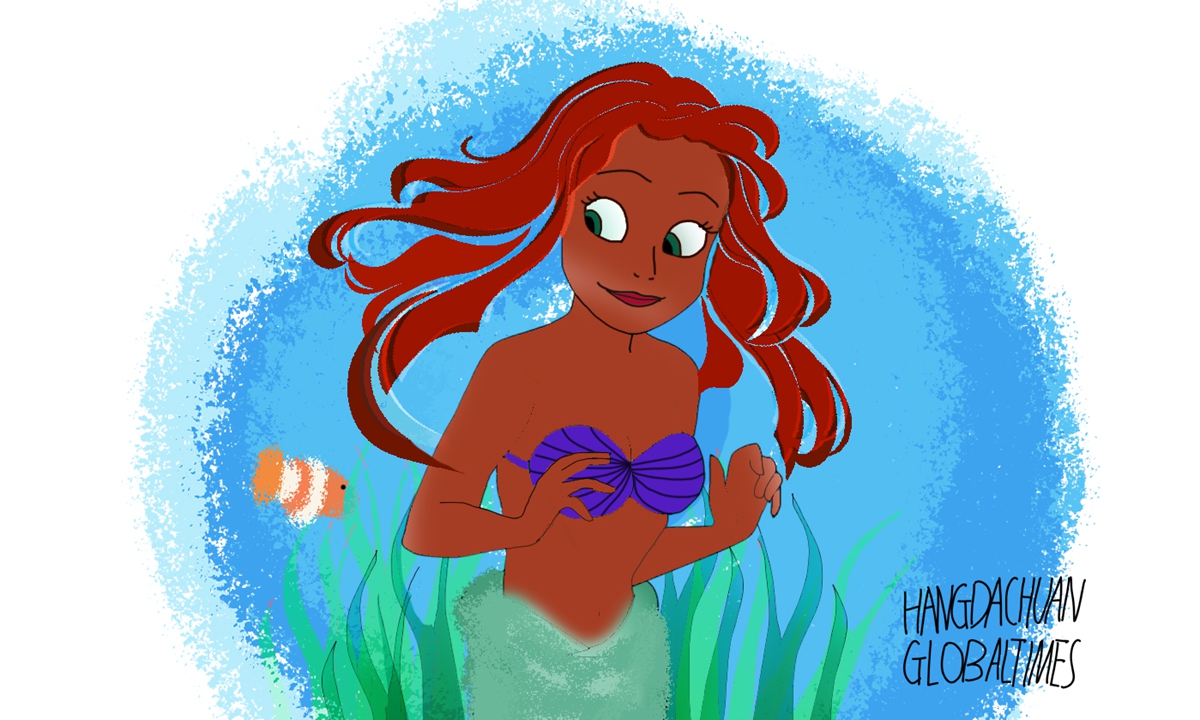ARTS / FILM
‘The Little Mermaid’ shows Disney’s lazy storytelling strategy

Illustration: Hang Dachuan/Global Times
Disney's live-action adaptation of The Little Mermaid is set to be released in the Chinese mainland on Friday, the same day as North America. The film, featuring African-American actress Halle Bailey, has caused a debate about representation in entertainment and highlighted the challenges of adapting beloved, traditional tales.
Currently, The Little Mermaid has received mixed reviews in North America, with a 70 percent fresh rating on Rotten Tomatoes but only a 42 percent fresh rating from top media outlets. Additionally, the film's Metacritic score has dropped from an initial 61 to 59.
Many who have watched the film during pre-screenings have criticized Disney for lacking imagination and misinterpreting the essence of what made its original children's film successful.
The rather "poor rating" looks like its performance in China is not optimistic.
Current pre-sales plus pre-screenings is about 410,000 yuan ($58,193) in the Chinese mainland, and the screen rate for its debut has also dropped from 30 percent to 13 percent.
Many Chinese netizens said that like "Snow White," the image of the mermaid princess in Hans Christian Andersen's fairy tales has long been deeply rooted in their hearts, and it takes a leap in imagination to accept the new cast.
Similar sentiments were echoed by Japanese audiences, with rumors that the comment section on the film's presale page was disabled due to a backlash. Based on these reactions, it seems unlikely that The Little Mermaid will perform well in East Asian markets.
Disney's decision to cast a person of color as the lead in The Little Mermaid seemingly was made to break stereotypes and promote equality, but so far, the negative reactions outweigh the positive ones.
This begs the question of whether Disney's "political correctness" actions are motivated by capital interests or genuine concern for representation.
Despite the controversy, The Little Mermaid has generated significant buzz online, with the trailer receiving record-breaking views and even inspiring viral videos featuring an AI actress.
According to media reports, the first full trailer promoting The Little Mermaid generated more than 108 million global views in its first 24 hours, making it one of the most watched trailers for any title in Disney's growing stable of live-action reimaginings, and the biggest for a Disney live-action title since The Lion King in early 2019.
Moreover, the film's controversy has garnered attention and created a new discourse around classic fairy tales.
Karey Burke, president of Disney's General Entertainment Content, once vowed to have more inclusivity in the company's productions - as the entertainment giant works to make underrepresented groups, such as racial minorities, account for at least 50 percent of its regular characters by the end of 2022.
Whether Disney's "politically correct" actions are misguided or genuine is up for debate, but it is clear that the film's controversy has created a new discourse around classic fairy tales and their place in modern society.
The Little Mermaid is just one example. The new Peter Pan and Wendy features a black actress as the fairy Tinker Bell and the live-action adaptation of Snow White stars a Latina actress.
The controversy surrounding Disney's forced inclusion of minorities in classic films is not about racism, but its lazy and irresponsible storytelling strategy.
If the company truly wants to represent marginalized groups, why not create original stories that reflect their experiences instead of turning classic tales into "sacrificial lambs" for political correctness?
When the beautiful stories that have accompanied countless children's childhoods become arenas for racial conflict, they lose their meaning and become devoid of romance and fantasy, replaced by arguments about skin color.
If Disney continues following this path, audiences, especially innocent children will no longer care if the "prince and princess live happily ever after," but "what is the skin color of the prince and princess," and the fairy tale will lose its magic glory.


